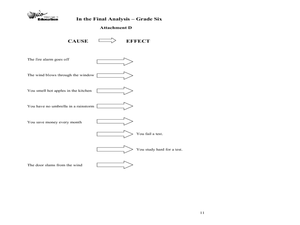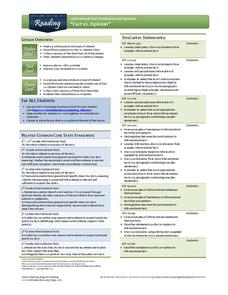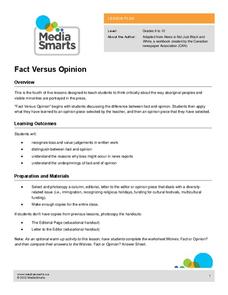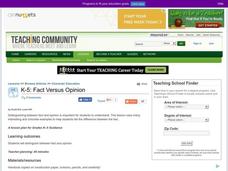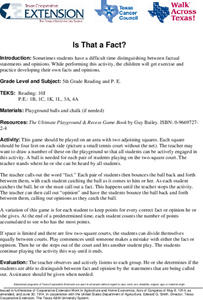Curated OER
Eastside Literacy Reading Lesson - Fact or Opinion
Analyze critical thinking skills that involve the ability to distinguish between fact and opinion through self-reflection. Higher education students will collect a newspaper article, advertisement, magazine article, tabloid article,...
Curated OER
It's Your Opinion
Everyone has a different opinion about the characters they read about in books. Have your class explore forming an opinion and finding evidence to support it as they read and discuss what they think about a particular character. They...
Curated OER
Fact Versus Opinion
Young learners distinguish statements as fact or fiction. After exploring a newspaper, they determine the type of information it contains. They read editorial articles and discuss the differences between the editorial page and the front...
The New York Times
News and News Analysis: Navigating Fact and Opinion in the Times
Help your class understand the difference between fact and opinion by exploring the New York Times homepage and articles. In pairs or small groups, pupils complete a scavenger hunt, answering the provided questions. Next, discuss the...
Curated OER
Facts vs. Opinion (Part 1)
Provide pairs of learners with a three-page Fact vs. Opinion packet. The first page of the packet provides a definition of these terms and an opportunity for guided practice. Partners then share their ideas to complete the practice...
Curated OER
Fact vs. Opinion (Part II)
How can you tell the difference between fact and opinion? Using newspapers, learners determine which articles contain statements of fact, and which articles reflect the writer's opinion. The lesson plan includes a discussion format and a...
Curated OER
Fact V. Opinion
Students use statements out of newpapers to distinguish between facts and opinions. They discuss these differences as well.
Curated OER
Fact Or Opinion
Groups of junior highers find newspaper articles which contain both facts and opinions, and present examples of each to the class. The focus is on discerning between fact and opinion. Two excellent worksheets are embedded in the plan...
Curated OER
The Final Analysis: Cause and Effect, Fact and Opinion
Middle schoolers read and review informational texts, analyze cause and effect, and distinguish fact from opinion. They assess a "one-minute mystery" you read aloud for cause and effect relationships. Resource includes complete set of...
Newseum
Editorials and Opinion Articles
Reading the news is fun, and that's a fact! With the lesson plan, scholars differentiate between fact and opinion as they read editorial articles. They complete a worksheet to analyze the information before writing their own editorials...
Curated OER
Is It Fact or Opinion?
Distinguish between fact and opinions in this nonfiction reading lesson. Middle schoolers read 'The Diary of an Early American Boy' and work in groups to analyze the text. They record the facts and opinions for the text.
For the Teachers
Fact vs. Opinion
Many informational texts are written as factual, but can your learners determine when an opinion is presented as fact? Have your kids read several articles on the same topic and record the statements that contain either facts or...
Media Smarts
Fact versus Opinion
Part of a series aimed at breaking down cultural bias from the Canadian Media Awareness Network, this activity identifies where opinions do and don't belong in a newspaper. Pupils review handouts about the purpose of editorial comments...
PBS
Facts vs. Opinions vs. Informed Opinions and their Role in Journalism
Do reporters write about what they see, or what they think? Examine the differences between investigative writing and opinion writing with a activity from PBS. Learners look over different examples of each kind of reporting, and convince...
Curated OER
Fact Versus Opinion
Students differentiate between fact and opinion. They define fact and opinion, then listen to and identify examples of each. Students identify different books where facts and opinions can be found, and cut out newspaper and magazine...
Curated OER
Distinguish Fact from Opinion in Passage
Is it a fact or is it an opinion; readers need to know. Second graders learn a new technique to determine if a sentence or reading passage is fact based or opinion based. They read and then ask evidence based questions to determine if...
Curated OER
Fact
Young scholars read about polar bears and discuss and identify the facts they learn about them. In this facts lesson plan, students explain why their facts are not opinions.
Curated OER
Build Mastery: Fact and Opinion
Is it a fact or an opinion? Get your kids up and moving during this reading comprehension activity. They listen to you read a book or passage (consider writing something yourself to get the ideal text), listening for facts and opinions....
Curated OER
Lesson 3: Proving Facts and Forming Opinions
Time for Kids: Butterflies is used to model the process of determining if a text is based on fact or opinion. Children are taught how to skim for key words, and use headings or chapter names to locate proof of whether or not what...
Curated OER
It's a Matter of Opinion
Dissect the parts of an advertisement with your class. Middle schoolers discuss advertisements and locate the hook in them. Then, they create an advertisement for a business, in which they include the name of the business, an...
Curated OER
Is That a Fact?
Middle schoolers write examples of facts and opinions on the board. In groups, they develop their own definitions for facts and opinions and share with the class. In new groups, they complete a worksheet in which they place statements...
Curated OER
Is That a Fact?
Fifth graders use physical activity to help them distinguish between facts and opinions. They are broken up into pairs and students give a fact or opinion (based on the call by the teacher) when the ball is bounced to them.
Curated OER
Fact and Opinion Lesson Plan
How are fact and opinion different? Middle schoolers explore fact and opinion and write articles pertaining to a football match, eliminating all opinion statements in order to focus on the facts. Then they discuss bias in the media....
Curated OER
Veterans Day Fact And Opinion
In this fact and opinion worksheet, students answer 10 questions about the Veterans Day holiday. Students decide if the statements given are facts or opinions.
Other popular searches
- Fact Opinion Lesson Plans
- Fact and Opinion Passages
- Fact Opinion Worksheet
- Fact and Opinion Lessons
- Teaching Fact vs. Opinion
- Fact and Opinion Worksheets
- Teaching Fact and Opinion
- Fact and Opinion Games
- Reading Fact and Opinion
- Fact and Opinion Keywords
- Identifying Fact or Opinion
- Fact Opinion Quiz










